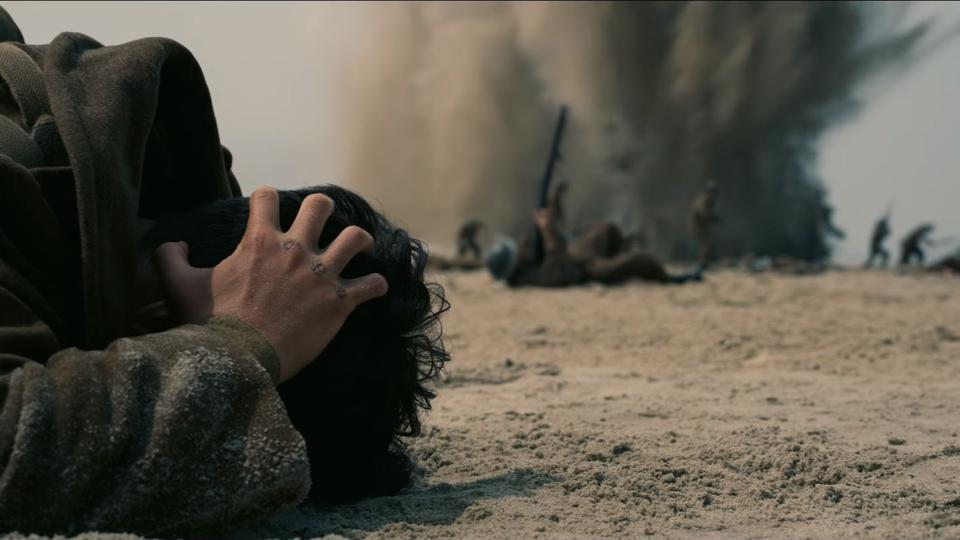"Dunkirk" (2017) Review
You ever wondered what The Lost Patrol would look like if instead of having a dozen soldiers hunted by an unseen enemy, it was four hundred thousand soldiers hunted by an unseen enemy?
To be entirely fair, I doubt that The Lost Patrol was Christopher Nolan's primary point of reference in making his brand new war epic (he has said on multiple occasions that silent films informed most of his direction here, and The Last Patrol definitely isn't silent, a point I'll be revisiting later), but it was the first film that came to mind. For those of you who don't know, The Lost Patrol is a John Ford film from 1934 where a group of twelve British soldiers in Mesopotamia during World War I end up trapped in desert ruins being picked off by unseen Arab snipers. It's a unique approach to a war film, intimate and ahead of its time in some ways. It's definitely not perfect and has plenty of the trappings and flaws of early 1930s filmmaking, but the almost ghost-like presence of "the enemy" is genuinely frightening.
In Dunkirk, the Nazis literally appear in two shots as individual soldiers, one shot from far away, the other putting them out of focus. Otherwise, they're completely off-camera or we see their planes. That's it. This sparse approach is the key to Dunkirk's success as a film, a movie that feels stripped down to its bones in several aspects. The story has a couple hundred thousand lives to save, and it doesn't have the time to deal with too many small details.
Few characters are named and just as few are blessed with dialogue. The film is split into three distinct storylines moving at different speeds. "The Mole" deals with British soldiers desperately evacuating the titular city over the course of a week. "The Sea" deals with British civilian boats being sent across the water to rescue the soldiers over the course of a day. And "The Air" features British pilots attempting to keep the boats and soldiers safe over the course of an hour.
If that sounds confusing, wait until you see how the movie assembles all three timelines. I imagine that Dunkirk probably improves on repeat viewings so that it's easier to figure out how these disparate stretches of time are condensed together. It takes a while for all three stories to properly intersect, but when they do, it's incredible, some of the best work Nolan has put together on screen. But I'll admit that it was confusing to get to that point and if there's anything that'll hold the movie back for some, this will be the issue. That, and the lack of central characters or any real dialogue.
The Mole barely has any dialogue, which is surprising considering the soldiers at its center are the closest we have to main characters. You'd think that maybe The Air would feature a fair amount of dialogue since its pilots communicating with one another, but it barely has dialogue either, opting for Tom Hardy to mostly act with his eyes. That might sound like a condescending joke, but it's not. Not at all. It's one of Hardy's greatest performances.
The bulk of the dialogue comes from The Sea, mostly from Mark Rylance as the operator of a pleasure yacht. The characters that populate the yacht, from Rylance, to his son, to another young man on the boat, and a shell-shocked soldier they find early on played by Cillian Murphy. Ironically enough, by having the most individually focused parts, this storyline feels weaker at first, but quickly turns into something painful in its own right.
The key to Dunkirk is understanding that even though the film does name its individual characters occasionally, it's not concerned with small human things. It's concerned about how multiple individuals move to create a moment, to create a historical event. The massive 70mm IMAX cameras used for the majority of the film's runtime seem dedicated to showing as much as humanly possible, with cinematographer Hoyte Van Hoytema turning in incredible work.
But it's absolutely worth highlighting the one unifying factor that ties all of this film together: Hans Zimmer's musical score. Remember seven paragraphs back when I mentioned that The Last Patrol wasn't a silent movie? This is where that comes back. The music of The Last Patrol was composed by Max Steiner, the musical genius behind the original King Kong. His music kept the feeling of creeping isolation in that The Last Patrol. It's essential to the movie. And in that same way, Hans Zimmer's score makes Dunkirk the film that it is. The music is even tied to the sound design, inserting the ticking of a stopwatch into the notes themselves.
Combine the massive feeling evoked by the scale of the story, the visuals, and the music, and you have the most overwhelming film I've seen in a long time, one that actually drove me to tears. Dunkirk is absolutely worth seeing in a theater and on the biggest screen you can find. Christopher Nolan's dispassionate approach to characters is fascinating to me, and while it can have mixed results from time to time (which is code for The Dark Knight Rises and Interstellar), it usually works in Nolan's favor in the end. And it worked here, and I'm happy to see that.
Oh, and I guess it's worth mentioning that Harry Styles is a pretty good actor in this. I mean, he's not Tom Hardy or Cillian Murphy here, but he's way better than I thought he'd be and good on him for taking on a challenging film like this.



